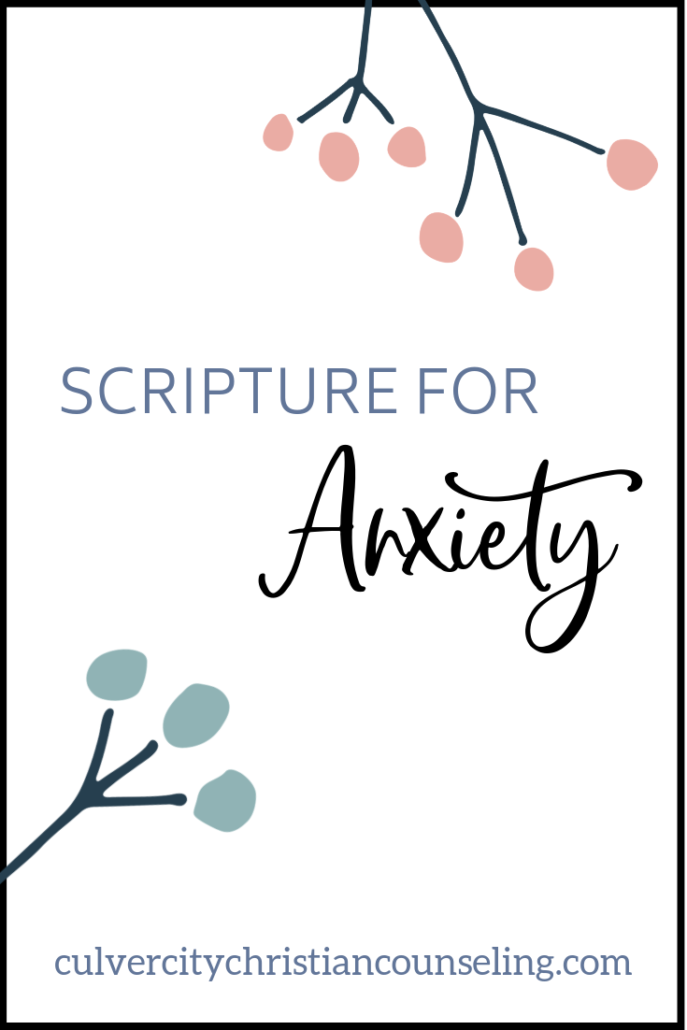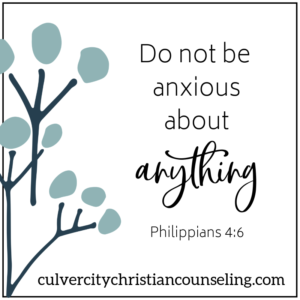If you are one of the many Christians who struggle with anxiety, then you’ll be all-too-familiar with the huge impact that anxiety can have on your life. Anxiety can take many forms — from general nervousness about unfamiliar situations, to debilitating panic attacks on a frequent basis.
Modern life puts a huge amount of pressure on people, which may go some way to explain the large increases in the number of people who struggle with anxiety. Even if your anxiety is relatively mild, it can still keep you from enjoying a fulfilled life. More severe cases can make you feel trapped by your fears and worries, unable to have any real quality of life.

There are different types of anxiety, including panic disorder, specific phobias, social anxiety, obsessive-compulsive disorder, post-traumatic stress disorder, and generalized anxiety disorder.
No two people experience anxiety in exactly the same way, and there can be a variety of triggers for anxiety. Understanding what triggers your anxiety is a good starting point for taking back some control when it feels like anxiety is ruling your life.
No matter whether you have mild or severe anxiety, it can be helpful to seek God’s perspective. What does the Bible say about anxiety? There are actually a lot of passages in Scripture for anxiety issues, and one of the most common themes throughout the Bible regarding anxiety is to cast your cares on the Lord.
In this article, we’re going to be looking at five key Bible verses about anxiety, and how meditating on these verses can help you to calm your fears.
Worrying Doesn’t Accomplish Anything
That is why I tell you not to worry about everyday life—whether you have enough food and drink, or enough clothes to wear. Isn’t life more than food, and your body more than clothing? Look at the birds. They don’t plant or harvest or store food in barns, for your heavenly Father feeds them. And aren’t you far more valuable to him than they are? Can all your worries add a single moment to your life?
So don’t worry about these things, saying, ‘What will we eat? What will we drink? What will we wear?’ These things dominate the thoughts of unbelievers, but your heavenly Father already knows all your needs.
Seek the Kingdom of God above all else, and live righteously, and he will give you everything you need. So don’t worry about tomorrow, for tomorrow will bring its own worries. Today’s trouble is enough for today. – Matthew 6:25-27, 31-34

In this famous passage, which is one of the most commonly quoted Bible verses about not worrying, and taken from Jesus’ sermon on the mount, we’re given a direct insight into what God thinks about anxiety: it accomplishes nothing. Anxiety is, in essence, extreme worry, and Jesus explicitly tells us that we’re not to worry about the things that may, or may not, happen in the future.
Living in a constant state of anxiety is not only damaging mentally but physically, too. It increases the risk of cardiac disease, for example (Celano et al, 2016). When Jesus asks, “Can all your worries add a single moment to your life?”, we’re reminded of the futility of being enslaved by anxiety.
The alternative to worrying (or anxiety), Jesus says, is to trust in the truth that God knows your needs and will provide you with all that you need. If you’re facing difficult circumstances, of course, it is quite a challenge to stop being dominated by anxiety and to trust God completely.
Our fears are often compounded, too, by the human tendency to confuse the things that we want with the things that we need. When God doesn’t give us the resolution that we want, we may think, then, that He doesn’t really know what we need, or is unwilling to give it to us – thereby justifying our fears and anxieties. However, you need to remember that God always wants the best for you – and that often means not giving you what you want.
Finding the Peace of God
Don’t worry about anything; instead, pray about everything. Tell God what you need, and thank him for all he has done. Then you will experience God’s peace, which exceeds anything we can understand. His peace will guard your hearts and minds as you live in Christ Jesus.
And now, dear brothers and sisters, one final thing. Fix your thoughts on what is true, and honorable, and right, and pure, and lovely, and admirable. Think about things that are excellent and worthy of praise.
Keep putting into practice all you learned and received from me – everything you heard from me and saw me doing. Then the God of peace will be with you. – Philippians 4:6-9

When you’re battling with anxious thoughts and feelings, you’re not at peace. Worry can consume your thoughts day and night – and when we’re preoccupied with these kinds of thoughts, prayer is often the last thing on our minds.
This passage of Scripture is a popular one because it’s like the Great Physician is giving us a prescription: “take this Scripture for anxiety, five times a day, or as needed.” There are several parts to these verses that we need to unpack.
Firstly, the Apostle Paul reminds us that instead of worrying, we should immediately turn to God in prayer. Doing this has an immediate effect because when we’re actively praying, we can’t simultaneously be preoccupied with anxious thoughts.
Secondly, we’re told to tell God what we need and give Him thanks for all that He has already done for us. Giving thanks to God for past help forces our minds off our fears and reminds us of other times when we’ve been afraid and God has helped us in some way. Together, these first steps allow us to experience God’s peace instead of being crippled by anxiety.
Finally, once we’ve reached that place of peace, Paul has a remedy to keep anxious thoughts from taking over – and it’s really simple (in theory, at least).
Fixing our thoughts on good things, pure things, honorable things, and so on, means that there’s less room in our thoughts for anxiety to run rampage. This is something that you will have to put effort into doing on a daily basis, but it’s a biblical remedy that really works to alleviate anxiety.
Casting Your Anxieties on the Lord
So humble yourselves under the mighty power of God, and at the right time he will lift you up in honor. Give all your worries and cares to God, for he cares about you. – 1 Peter 5:6-7
There’s a common theme in passages about anxiety in the Bible. Over and over, the Bible talks about how, if we are struggling with anxiety, the solution is to hand over our worries to God. In some translations of this passage, verse 6 reads, “casting” instead of “give”, which creates a more vivid picture of how God expects us to handle anxiety.
The association with casting is that of tossing or throwing your anxieties to God to handle – with the same kind of motion that you’d use to cast a fishing line into the water. There’s something quite powerful about this idea that brings to mind the way a child will fling things (and themselves) into their parents’ arms.
God is a loving Father who wants us to turn to Him with our worries — and not just talk to Him about them in prayer, but actually throw them to Him so that He bears the burden of carrying and dealing with them. When we do this, those anxious thoughts that have been weighing us down and controling our lives are lifted.
Believe in the Promises of God
This is why I remind you to fan into flames the spiritual gift God gave you when I laid my hands on you. For God has not given us a spirit of fear and timidity, but of power, love, and self-discipline. – 1 Timothy 1:6-7
God doesn’t want us to be slaves to fear – that’s a simple truth conveyed in most Bible verses about anxiety. He gives us the Holy Spirit to help us in our everyday lives – and the Spirit is powerful, loving, and helps us to control our fleshy desires. Anxiety arises when we forget that we have the Holy Spirit with us at all times.
Free will means that we have to willingly ask for the Spirit’s help to get control of our fears and experience the power that God has promised to all who believe in Him. Being controlled by anxiety is the opposite of what God intends for us, and when we’re in this state of fear and worry, we’re depending on our own strength, not the immense power of the Holy Spirit.
Choosing to call on the power that’s within us to overcome our anxious thoughts doesn’t mean that anxious thoughts won’t return. It’s a constant process of reminding ourselves of the promises that God has made to His children.
Our Hope is in God
I heard a loud shout from the throne, saying, “Look, God’s home is now among his people! He will live with them, and they will be his people. God himself will be with them. He will wipe every tear from their eyes, and there will be no more death or sorrow or crying or pain. All these things are gone forever.” – Revelation 21:3-4

When you’re struggling with anxiety, it can be hard to imagine a future that isn’t shrouded in worries and fears. The good news is that you don’t have to rely on your imagination to conjure up an image of what such a future might look like. The Bible actually gives us a really clear picture that can give you hope when it feels like you’re trapped in anxiety.
Revelation 21 talks about the future that God promises to all Christians. In this future, God will not be an invisible presence in the world. He’ll be walking among us, living with us. The promise that God “will wipe every tear from their eyes,” and “there will be no more death or sorrow or crying or pain” is an immense comfort when life is constantly throwing up problems that trigger your anxiety. Trust in the promises of God. He always keeps His promises, at the right time.
Christian Counseling for Anxiety
When you’re struggling with feelings of anxiety, it’s really helpful to explore these – and other – Bible verses about anxiety. However, you may also benefit from getting in touch with a Christian counselor.
Christian counseling gives you the opportunity to talk about your anxiety, and explore your triggers, with a trained professional who will bring a Biblical perspective (not only a psychological one) to each session.
Working with a Christian counselor, you can discover more Scriptures about anxiety and discuss your feelings about anxiety in the Bible. You’ll learn tools to help cope with your anxiety and have a safe space to discuss the underlying issues that may be at the root of your anxiety.
References
Christopher M. Celano, M.D., Daniel J. Daunis, M.D., Hermioni, N. Lokko, M.D., Kirsti A. Campbell, B.S., and Jeff C. Huffman, M.D. (2016) Anxiety disorders and cardiovascular disease: https://www.ncbi.nlm.nih.gov/pmc/articles/PMC5149447/
-
Kate Motaung: Curator
Kate Motaung is the Senior Writer, Editor, and Content Manager for a multi-state company. She is the author of several books including Letters to Grief, 101 Prayers for Comfort in Difficult Times, and A Place to Land: A Story of Longing and Belonging...





